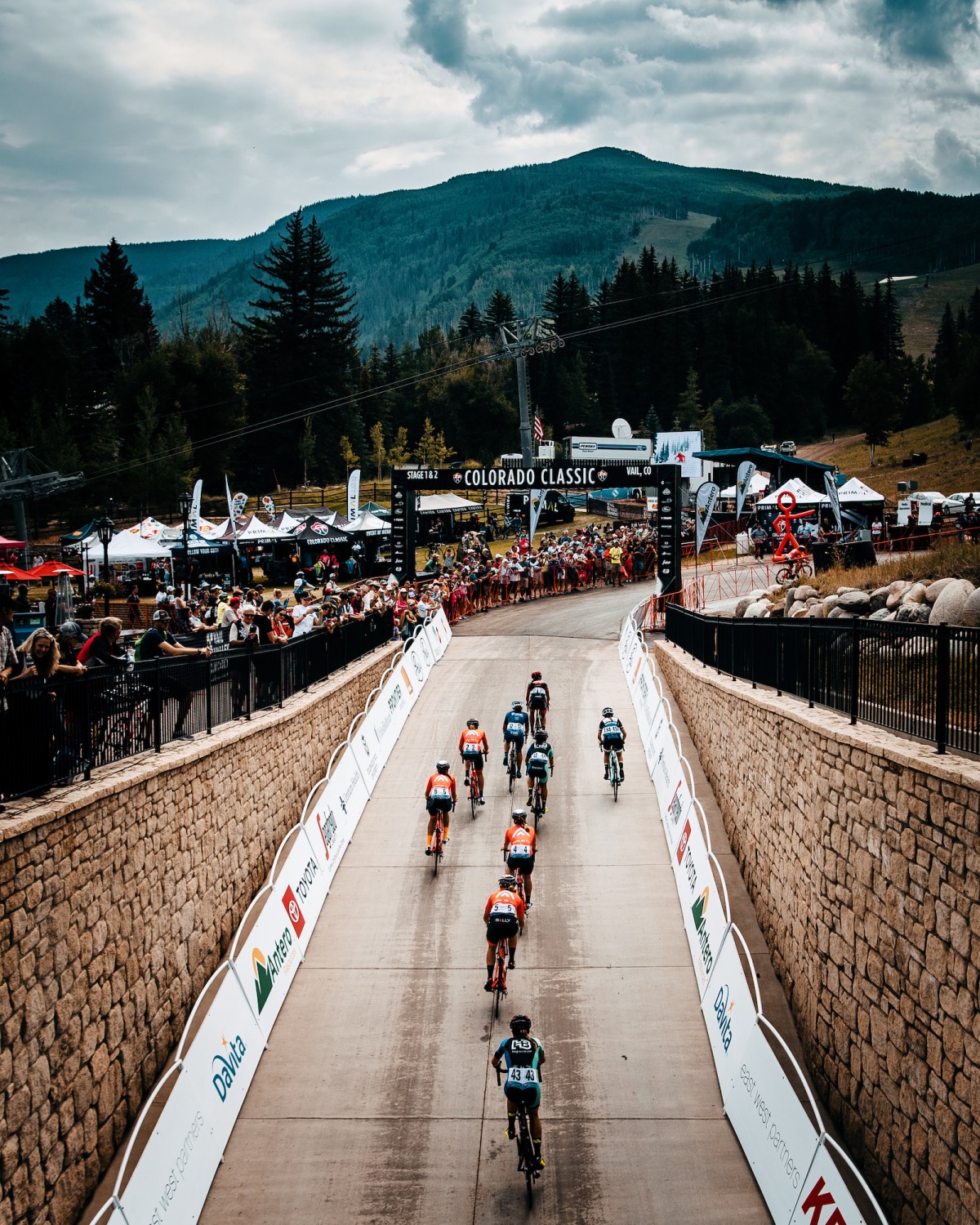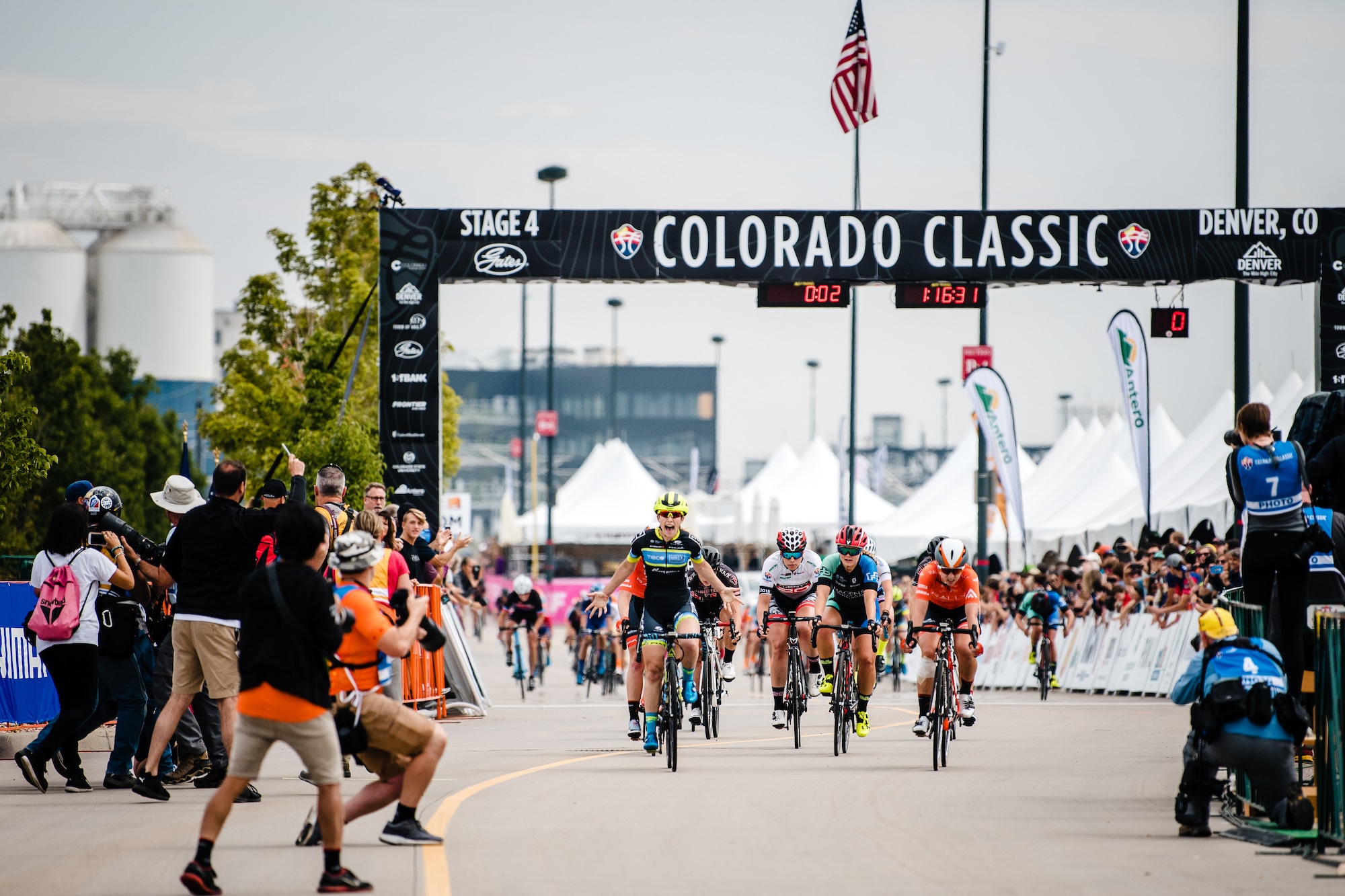Since its inception in 2017, the Colorado Classic, a Union Cycliste Internationale (UCI)-sanctioned four-stage pro road bicycle race, has tried to empower women. Year one, the organizers opted to have legacy riders replace podium hostesses at the end of each stage. “We wanted to be less patronizing and more celebratory,” says Lucy Diaz, COO of race organizer RPM Events Group. And last year, the women’s races were spread across four days—same as the men’s—rather than the initial two.
But the playing field was far from equal. According to Diaz, last year the men received a $70,000 prize purse. The women? Just $20,000. Male athletes were put up in hotels while the women had to find host families.
So it was eye-catching when the organizers announced last December that this year’s event, which took place August 22–25, would be the only women’s stand-alone stage race in the Western Hemisphere.
“The Tour de France is the pinnacle of the sport, and there isn’t a parallel for women,” says Diaz. ”We ultimately hope to create a race of that caliber. The women will no longer be a plus one.”
Abigail Mickey, a pro cyclist who competed as part of Rally UHC Cycling Women, says treating professional female cyclists like professional athletes is an important first step to garnering more respect for the sport.
“‘What else do you do?’ is a common question I’ve never heard anyone ask my fiancé [Toms Skujiņš], who is also a professional cyclist,” says Mickey. “People find it really hard to believe it’s my job. A follow-up question is always, ‘What will you do next?’ [That’s] another question my fiancé never gets.”
Jennifer Luebke, a pro cyclist who competed on team TWENTY20, made the switch from triathlons to cycling in 2015 and says she was initially shocked by the gender disparities in the sport.
“Eventually you become numb to it,” she says. “You walk a fine line deciding how much you complain because you are grateful to have a race, but you also want to say, ‘Wouldn’t it be great if we had the same platform as the men?’ You are not being paid equal prize money. You are not offering us the same packages. The race courses are disappointing.”
At last year’s women’s criterium race at the Classic, riders remember thinking the course might as well have been a Costco parking lot. “You hoped your sponsor wasn’t watching,” says Lindsay Goldman, a pro cyclist who will be competing on team Hagens Berman-Supermint.
This year’s Classic aimed to address many of these disparities. It’s also betting on the wave of women’s empowerment as a business strategy to make the race succeed financially. In this regard, the Classic will serve as a case study for some of the biggest issues affecting women in professional cycling.
If a cycling event is struggling to profit, for example, the women’s races are typically the first on the chopping block. By cutting the men’s race instead, the Classic is going for the opposite approach. Still, the recent cancellations of other races—including men’s and women’s for the North Star Grand Prix and the Philadelphia International Cycling Classic, and the women’s portion of the Tour of Utah—have many female cyclists questioning whether the Colorado Classic’s plan will succeed or if the race will even make it to 2020.
“I think it’s great what they are trying to do,” says Goldman. “But what happens if they do everything right and no one watches it?”

Photo Credit: Ashley and Jered Gruber/Courtesy of the Colorado Classic
Like many cycling races, the Colorado Classic has struggled to find a financially viable model. Unlike football or tennis, cycling races are not ticketed events. Logistics like road closures and a car fleet for rider support require a huge financial investment. Diaz says one idea the Classic used to make money was to combine the race with a ticketed music festival. They called it Velorama. But the synergy between a cycling race and a concert just didn’t work, she says. Their next idea? Spotlight women. “We couldn’t believe that women had one third of the race opportunities men do,” she says.
The 2019 field included nearly 100 elite racers from 16 teams, including five international teams. In addition to a $75,000 prize purse—nearly four times what was offered in 2018—and hosting athletes in hotels, the organizers put a great deal of care into designing the courses so they would be exciting for both the racers and the spectators. The first 54.2-mile stage climbs 4,255 vertical feet. In the Queen Stage, another climb hits grades up to 14 percent. The final stage is a sprint-friendly 52.8 miles that begins and ends at Denver’s Coors Field. That final day also includes an open streets section, to engage the public.
Getting people to care also means creating awareness and exposure around the sport. Even men’s cycling lacks visibility in the U.S. compared to Europe, where the sport has a deep history. To get fans more interested in the athletes, they need to know who the players are. “Weeks before the Tour de France starts, the articles all over cycling and non-cycling magazines alike are about who will win, who has shown good form, will so-and-so be at the race,” says Mickey. “By July, fans of the sport will know more about their favorite riders than just their names.”
Perhaps the most important investment the organizers made this year was dedicating tremendous resources to live coverage of the event. In its first year, the Colorado Classic was aired on NBC Sports at 11:30 pm, far from the most alluring time slot for fans or sponsors. This year, livestreaming was available through the race’s Facebook page and Tour Tracker mobile app, and the organizers had 15–20 syndication partners, including regional provider Altitude Sports and Entertainment, the Global Cycling Network, and Kiswe CloudCast in Spanish. Not only is this new distribution model cheaper, organizers of the Classic hoped to attract more viewers.
One of the biggest complaints has been the scheduling of the race. Iris Slappendel, executive director of the Cyclists Alliance, an advocacy group for female racers, points out that the field would miss many of the top women’s teams from Europe due to scheduling conflicts. Only three of the 16 teams are from Europe.
As general manager of team Hagens Berman-Supermint for the past four years, Goldman knows first-hand that doing everything right doesn’t always guarantee success. Earlier this year, law firm Hagens Berman announced that it would discontinue its title sponsorship for the women’s team for 2020. Team member Liza Rachetto has been racing professionally for 15 years and says she will now be going to a team that does not offer a salary. “You’d think with more experience I’d be progressing, not digressing,” she says.
Goldman adds that ultimately sports exist as entertainment and you can’t create demand for entertainment in a matter of weeks, as the Classic is attempting.
“Personally, I get caught up as a racer doing the best I can to shave seconds off of my performance,” she says. “But as we grow the sport, the focus has to be less about the hopes and dreams of athletes and more about increasing consumer appeal. At the end of the day it’s not so much about equality as it is figuring out a successful business model and that’s something even the men haven’t done well.”
